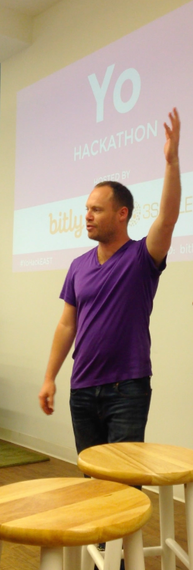Yo Hackathon @bit.ly, New York City, July 26th, 2014
Walking into Bit.ly's Manhattan headquarters for the Yo hackathon (Two letters/Two hours) at 5:30pm on a Saturday afternoon in July felt like I had stepped into a George Romero-esque dreamscape of flesh eating technologists with no hope of surviving the night let alone the weekend.
5:35pm: Glass enclosed elevator vestibule. Receptionist checking in participants. Open plan office. Large bowls filled with iced carbonated beverages. Ping pong game in progress. Everything pretty much the hackathon normal.
5:45pm: Assortment of dudes in tee shirts. A few women, as usual, I counted maybe three or four. Everyone milling about, forming an apprehensive herd as though being stalked by dystopian wolves and bounty hunters.
6:15pm: We have been summoned to the back room for the intro's and the Yo pitch. The movement of the group was surprisingly swift. I guess only two hours to produce a Yo service prototype concentrates the mind.
So this is Yo, the iOS App store phenomenon taking over mobile users insatiable touch and send disorder. What is Yo you ask? Yo is an app that sends Yo's. No jk. Pet rock? Trendy toy? Omen of a looming tech bubble? Another messaging app that will expose a cheating lover? Or could it be the app that redefines ping and ignites the imaginations of symbolic/emotive communicators; the lingua franca of those fed a steady diet of emoji keyboard hacks from birth.
The initial motivation for Yo, as the story goes, was to create a fast office PA paging tool for business partner Moshe Hogeg. Cofounder Or Arbel confides that Yo can appear disarmingly modest, even perplexing for most and often leads to blank stares. Yo is the simplest of what are known as pub/sub (publish/subscribe) patterns. Approaching Yo necessitates a lowering of expectations.
The media sarcasm surrounding the app's robust seeding has been penetrating and to some degree deserving but Arbel strikes me as no shrinking violet. The logo, in flat Barney purple, speaks a thousand Yo's. Arbel's vision is that healthy skepticism will lead to investigation and translate into wider adoption by creative users who will in turn build useful and popular Yo services. Many of the developers I spoke with at the hackathon reiterated their initial nagging skepticism but after playing with the API started to find some interesting use cases. Even I took a crack at creating a service that would send Yo's to alternate side parking nappers.
Perhaps as a way to add some meat to the bones and expand Yo's scope a new feature in beta will allow users to attach a link to a Yo. Here's how it works. Copy a URL. While in the Yo app select a user and hold until the link is delivered.
- EyeScream: Ruby website login service by Dustin Coates & Adrian Bautista
- YoSDK: By Yi Qin, the SDK abstracts the Yo API into native iOS objects
- YoVite: Send a Yo to RSVP an event and receive a Yo confirmation by Nathan Epstein, Adam Barcan and Fnu Christian
- YoAuth: Clever login authentication service that won 1st prize by Bilawal Hameed
- YoCitibike: CitiBike availability notification service
- Stopwastingyotime: A Google Chrome extension by Neil Chen
Photos courtesy of the author

